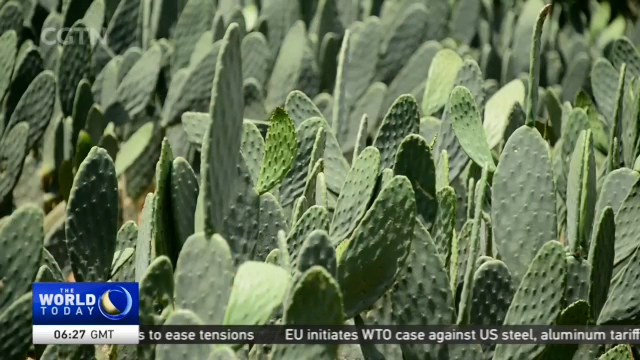
14:42, 02-Jun-2018
Plant Power: Mexican farmer creates methane gas with prickly pear waste
02:54

As clean and renewable energy becomes a greater focus for the international community, one farmer in Mexico is finding success in tapping power from an unusual source: a plant - emblematic to his country. Alasdair Baverstock went to meet him.
There's an expression here that goes: "It's more Mexican than the nopal." That's a type of cactus, better known as Prickly-Pear, emblematic of Mexico, even featured on the national flag. It's traditionally eaten, but one Mexican farmer believes it's also the answer to the country's green energy challenge. Rogelio Sosa now creates methane gas from what's left over after making prickly-pear tortillas.
ROGELIO SOSA NOPALIMEX "It is the agricultural product that produces the most biomass, as well as being a plant which can grow in conditions where other crops would fail. It's a way to make the countryside completely self-sufficient, and help the environment in the process."
Using what he calls a 'biodigestor', Rogelio can turn eight tons of prickly pear waste into four hundred and eighty cubic meters of methane gas every day. This same gas is then used to cook his tortillas, light his plant and even power his vehicles, allowing him to sell his product for far below current market prices.
ROGELIO SOSA NOPALIMEX "When we first started making tortillas, we would use four-thousand liters of gas a week. Now, using solar power to heat and making up the rest with gas we have produced, we consume three-hundred liters a month. It's a solution for the countryside, as it generates total self-reliance."
To complete the cycle, what's left over in the biodigester is used as a nitrogen-rich organic fertilizer on his crops.
ALASDAIR BAVERSTOCK ZITACUARO, MEXICO "Alternative fuels are becoming increasingly important in Mexico, following a target set by the federal government to produce thirty-five percent of the country's energy from renewable sources by 2024."
Santiago Barccon is an energy analyst, and says that while green energy is important, the country must take a balanced approach towards its power supply.
SANTIAGO BARCON ENERGY SECTOR ANALYST "Mexico has enormous potential to grow its energy efficiency, but unfortunately, it's very difficult to imagine civil society turning entirely to biogas, it's more large-scale industry that benefits from the innovations. In any case, the need for petrol will continue for, I estimate, at least another hundred years."
Undeterred by the macro-market trends, Rogelio says he will continue to operate his own way, concentrating on helping his local community with tangible energy solutions. Alasdair Baverstock, CGTN, in Mexico's Michoacan State.

SITEMAP
Copyright © 2018 CGTN. Beijing ICP prepared NO.16065310-3
Copyright © 2018 CGTN. Beijing ICP prepared NO.16065310-3